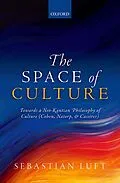Sebastian Luft presents and defends the philosophy of culture championed by the Marburg School of Neo-Kantianism. Following a historical trajectory from Hermann Cohen to Paul Natorp and through to Ernst Cassirer, this book makes a systematic case for the viability and attractiveness of a philosophical culture in a transcendental vein, in the manner in which the Marburgers intended to broaden Kant's approach. In providing a philosophical study of culture, Luft adheres to important Kantian tenets while addressing empirical studies of culture. The Space of Culture culminates in an exploration of Cassirer's Philosophy of Symbolic Forms, and argues for the extent to which Cassirer's thought was firmly rooted in the Marburg School, despite his originality. At the same time, it shows how Cassirer opened up the philosophical study of culture to new horizons, making it attractive for contemporary philosophy.
Autorentext
Sebastian Luft is Professor of Philosophy at Marquette University, Milwaukee. Prior to this, he has held several visiting professorships, including at Emory University, and worked as an editorial assistant at the Husserl Archives in Leuven, Belgium. He is currently serving as a DAAD visiting professor at the University of Paderborn, Germany.
Inhalt
- Acknowledgements
- Introduction
- Part I: The Marburg School. The Basic Position: Transcendental Philosophy and Philosophy of Culture
- 1: Herman Cohen: The Transcendental Method and Philosophy as a Foundational Science (Grundlegungswissenschaft) of Culture
- 2: Paul Natorp and the Broadening of the Marburg Method: The Reconstructive Method as a way to a Philosophy of Subjectivity; The Logic of Origin
- Part II: Ernst Cassirer's Philosophy of Symbolic Formation as a Transcendental Philosophy of Culture
- 3: The Transformation of the 'Transcendental Method' into a Critique of the Plurality of Cultural Formations
- 4: The System of Symbolic Formation and the Philosophy of Culture: Metaphilosophical Discussions
- Conclusion
- Bibliography
- Index
